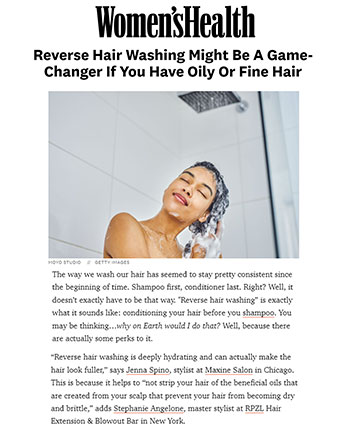Women's Health November 4, 2022
 Women's Health
Women's Health
Beauty
Reverse Hair Washing Might Be A Game-Changer If You Have Oily Or Fine Hair
Hairstylists explain how the technique works.
The way we wash our hair has seemed to stay pretty consistent since the beginning of time. Shampoo first, conditioner last. Right? Well, it doesn’t exactly have to be that way. "Reverse hair washing” is exactly what it sounds like: conditioning your hair before you shampoo. You may be thinking…why on Earth would I do that? Well, because there are actually some perks to it.
Meet Our Experts:
Jenna Spino, hairstylist at Maxine Salon in Chicago, Lacy Redway, Unilever stylist and celebrity hairstylist, Stephanie Angelone, master stylist at RPZL Hair Extension & Blowout Bar in New York
“Reverse hair washing is deeply hydrating and can actually make the hair look fuller,” says Jenna Spino, stylist at Maxine Salon in Chicago. This is because it helps to “not strip your hair of the beneficial oils that are created from your scalp that prevent your hair from becoming dry and brittle,” adds Stephanie Angelone, master stylist at RPZL Hair Extension & Blowout Bar in New York.
Using a conditioner in place of a shampoo is also “especially beneficial to those who experience dryness and or have curly/textured hair types,” notes celebrity hairstylist Lacy Redway. Plus, it can help your blowouts last longer. It might sound too good to be true, but like most things, it has its pros and cons.
Ahead, read all about the benefits and downsides to reverse hair washing.
Who Should Try Reverse Washing?
Anyone can reverse wash their hair, says Spino, but it works best for those with fine hair or oily scalps. Angelone and Spino support reverse hair washing for those with dry hair and scalps for the below reasons, but Redway is hesitant because it can remove important natural oils.
“When conditioning your hair first, it nourishes and preps your hair for the cleansing part without it being harsh or stripping your hair if you suffer from dryness,” Angelone notes, adding that “most conditioners tend to leave residue that are unwanted that creates greasy limp locks” which is why shampooing after helps.
It’s a good idea to double down and condition again after shampooing if you do have dry hair, though, because you might not see the same benefits, adds Spino. And if you skip conditioner anyway because it weighs down your fine hair or oily scalp, you’ll be sure to benefit from it too.
But if you have naturally curly, coily, knotty, or chemically-processed hair, reverse hair washing might not be for you, since it may make your hair more susceptible to tangles after shampooing. (More on this below.)
What Are The Pros and Cons Of Reverse Hair Washing?
If you do decide to make reverse washing part of your regular routine, you may see benefits like less oil on your scalp, healthier-looking ends, not having to wash your hair as much, and long-lasting blowouts (because it gets rid of “excess unwanted oils from conditioner by using it first then cleansing it out,” says Angelone).
The cons you might see are dependent on your hair type. This technique might not be the best course of action for folks with curly and natural hair, since traditional conditioning post-shampooing “helps maintain their curl structure and helps detangle,” she adds. And those with chemically-damaged hair should always condition last because “using the conditioner as a detangler after the cleanse helps prevent breakage,” she says. If you have this type of hair and do reverse hair washing, your hair might be stripped of its natural oils.
How To Reverse Wash Your Hair
Go for a high-moisture wash and care system, says Redway. She recommends TRESemmé Rich Moisture Shampoo and Conditioner because they’re “enriched with vitamin E, leaving hair feeling stronger, moisturized, and effortlessly manageable without weighing down your strands,” she says. She also loves the Nexxus Ultralight Smooth Frizz Defy Shampoo and Conditioner.
Spino’s rec is the Oribe Gold Dust Shampoo and Conditioner. “[It's] a hydrating, strengthening conditioner,” she says. “You wouldn’t have to worry about it being heavy when using the reverse method and would still reap all the benefits of the conditioner.”
Angelone typically prefers sulfate-free shampoo and conditioner. Her favorite of all time is Monday’s (Sulfate-Free) Monday Moisture Shampoo and Conditioner. “It's hydrating, nourishing, and detangling,” she says.
Angelone recommends reverse washing once every other week or even once a month—it's not something you should do every wash. “If you do it every time it's hair wash day, the conditioner can build up on the dirty hair and actually counteract the entire process,” she says.
